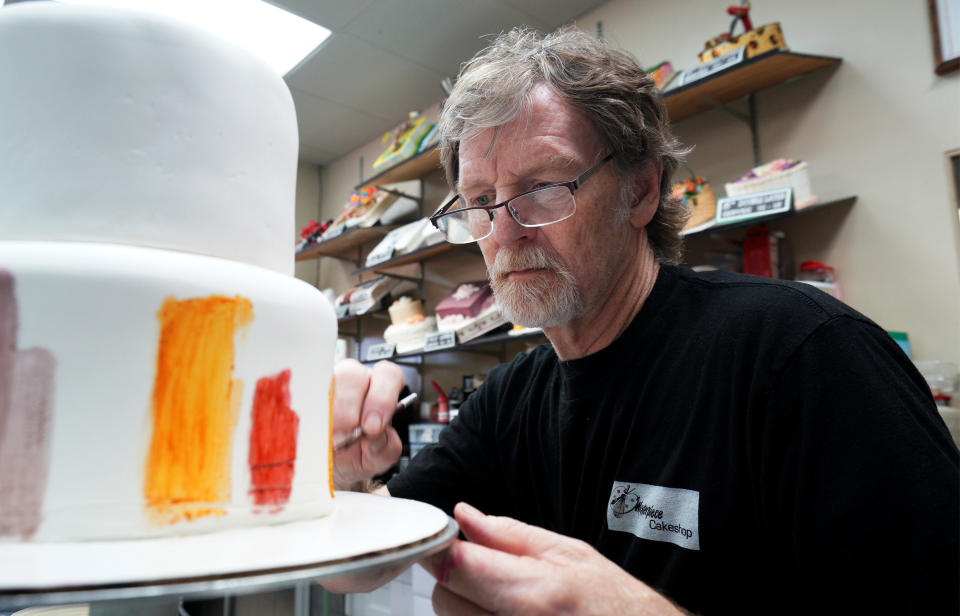Why the 'gay wedding cake' Supreme Court case is really about corporate governance

The Supreme Court will hear one of its most politically charged cases on Tuesday, when it takes on the case of a self-described cake artist who refused to design a wedding cake for two men.
That case, Masterpiece Cakeshop v. Colorado Civil Rights Commission, takes aim at a Colorado law that bars discrimination based on perceived sexual orientation in places serving the public. Jack Phillips, the owner of Masterpiece Cakeshop, says the law violates his free speech rights by forcing him to “create expression that violates his sincerely held beliefs about marriage.”
The dispute has attracted a lot of attention from the business community, including an amicus brief signed by 35 companies including Amazon (AMZN), Pfizer (PFE), and Apple (AAPL), which asked the court to rule against Phillips. Another group with an interest in the business community also weighed in on the case — 34 law professors who contend that Phillips’ argument runs counter to longstanding principles of corporate law.
Adam Winkler, a constitutional law professor at UCLA, pointed out that brief as one of the more interesting ones filed in the case. “This is not just a case about a baker. This is a case about a commercial enterprise — a business that wants to discriminate,” he said.
The Colorado Anti-Discrimination Act and the ‘corporate veil’
The corporate law professors’ argument turns on a concept known as the “corporate veil” — the notion that companies possess legal interests separate from their owners. This concept often protects owners from liability related to their businesses (except for some circumstances where a court decides it’s appropriate to “pierce the corporate veil” and hold shareholders personally liable for the misdeeds of their company).
“The first principle of corporate law is that for-profit corporations are entities that possess legal interests of their own and a legal identity separate and distinct from their shareholders,” the brief argues. “This legal ‘personhood’ holds true whether the for profit corporation has two, two hundred, or two million shareholders.”
In the case of Masterpiece Bakeshop, Jack Phillips and his company can’t “have their cake and eat it too,” the professors noted, perhaps intending the pun. That is, Phillips has benefited in a number of ways from having his corporation be separate from him. But now Phillips is asking the court to “disregard the notion of corporate separateness,” the professors argue.
The professors note that Phillips states the case involves “his artistic expression” and his personal religious beliefs — not those of Masterpiece Bakeshop. The sole incorporator of the cake shop is actually an attorney, the law professors’ brief points out — and it’s not even chartered as a religious organization.
While corporations can sometimes have First Amendment rights, this case conflates Phillips’ free speech rights with that of his company, the professors argue.
“Petitioners [Phillips and Masterpiece Bakeshop] want to argue, in effect, that the corporate veil is only a one-way ratchet,” the brief states. “Its shareholders can get protection from tort or contract liability by standing behind the veil, but the corporation can ask a court to disregard the corporate veil whenever the company is required by law to act in a way that offends a shareholder’s beliefs.”
A case that pits free speech against gay rights
The wedding-cake dispute goes back to 2012, when Charlie Craig and David Mullins visited Masterpiece and asked Phillips to design and make a cake for their wedding.
After Phillips declined, citing his religious beliefs, the couple filed charges of discrimination with the Colorado Civil Rights Division under the Colorado Anti-Discrimination Act. An administrative law judge sided with Craig and Mullins, and the Civil Rights Division issued a cease-and-desist order requiring the cake shop to comply with the state’s anti-discrimination law. Colorado’s court of appeals affirmed that order, spurring Phillips to ask the Supreme Court to take on the matter. The high court agreed to hear the case and will specifically answer this question: “Whether applying Colorado’s public accommodations law to compel the petitioner to create expression that violates his sincerely held religious beliefs about marriage violates the free speech or free exercise clauses of the First Amendment.”
As is often the case, the fate of this case could very well rest with Justice Anthony Kennedy, the court’s most reliable swing voter. Kennedy has written seminal opinions in favor of gay rights, including the 2013 opinion that struck down the Defense of Marriage Act and the 2014 decision that legalized same sex-marriage across the U.S. (the latter of which was memorably incorporated into wedding vows for both same-sex and opposite-sex couples).
Despite this record on gay rights, Kennedy’s vote is far from a sure thing in Masterpiece Cakeshop. That’s because Kennedy has a “very, very long steady stream of supporting people who claim their First Amendment rights were infringed,” as Winkler, the UCLA law professor, noted. Kennedy also wrote the controversial decision in Citizens United v. FEC, affirming the First Amendment rights of corporations to spend freely on candidate elections.
This case could pit Kennedy’s commitment to gay rights against his devotion to the First Amendment, particularly as it applies to businesses. Asked how the Supreme Court might ultimately rule on the matter, Winkler quipped, “What did Justice Kennedy have for breakfast this morning?”
Erin Fuchs is deputy managing editor at Yahoo Finance.
Read more:
Supreme Court’s newest justice invokes John Adams in high-profile cellphone case
AT&T-Time Warner suit could be the start of a more aggressive antitrust era
Antitrust expert calls Broadcom’s bid for Qualcomm ‘pretty audacious’
Harvey Weinstein scandal could expose a ‘murky, untested’ area of the law

